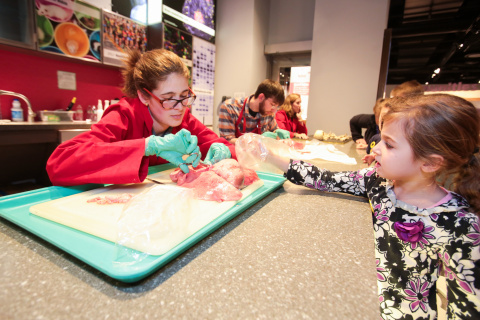The Biogen Idec Foundation has awarded the Museum of Science, Boston a $2.5 million grant to support its Hall of Human Life exhibition. In addition, the dynamic multi-media laboratory at the exhibit's focal point will be named the Biogen Idec Foundation Exploration Hub. Payable over five years, this is the largest single grant awarded by the Biogen Idec Foundation to any organization.

Photo Credit: © Nicolaus Czarnecki
The Museum's largest and most far-reaching exhibition since the 1990s, the 10,000-square-foot Hall of Human Life draws from the region's thriving life sciences and medical communities to revolutionize how visitors engage with their own biology and health.
"The Hall of Human Life is the largest and most complex exhibit we have ever created," said Ioannis Miaoulis, Museum president and director. "It is the culmination of everything we have learned about making exhibits, and it has inspired us to innovative new approaches to exhibit design. Moreover, it signals the beginning of a new era at the Museum as we transform our halls to tell the story of the natural and engineered worlds. We are thrilled with Biogen Idec Foundation's generous acknowledgement of our mission."
"The Biogen Idec Foundation and the Museum of Science share a long-term commitment to bring innovative, accessible and interactive STEM education to the greater Boston community," said Tony Kingsley, chairman, Biogen Idec Foundation. "The Hall of Human Life is a remarkable exhibition, and our support reflects the Foundation's goals of providing opportunities that encourage children to develop a love for science and learning."
Centrally located near the exhibition's entrance, the Biogen Idec Foundation Exploration Hub is the heart of the Hall of Human Life. Here, visitors find Museum educators and volunteers, who provide a personal and human face to this complex and vital subject. Against a backdrop of multi-colored DNA images and blood cells, these interpreters, often retired doctors, bench researchers, and students in health and biology fields, involve visitors in the excitement of experiments, demonstrations, and dissections.
In 2012, the Biogen Idec Foundation awarded the Museum $1 million, establishing the endowed Biogen Idec Foundation Science Education Fund to support interactive science education and outreach programs for middle and high school students across the state.
About the Hall of Human Life
Conceived to be a world-class resource reflecting Massachusetts' leadership in the life sciences and medicine, the Hall of Human Life aims to help the public make sense of rapid innovations in genetics and bioengineering by encouraging people to ask questions and build skills to make informed choices. The Museum created the Hall of Human Life in consultation with more than 130 leaders in public health and policy, the biotech industry, the medical research community, and university labs to reflect current research and inspire curiosity. Technologically ambitious, the exhibition involves visitors in new ways, using sophisticated digital technologies and media to experiment with real time onsite research, forums, online collaboration, and lab experiences.
When visitors step inside the Hall of Human Life, they receive a wristband that allows them to record experiences at interactive Link Stations. Signaling the volume of visitor interest, nearly 40,000 unique wristband barcodes have been scanned since the hall's mid-November opening.
Walking through five dynamic environments related to Food, Organisms, Physical Forces, Time, and Communities, visitors learn how forces in each of these environments change us biologically, how we change them, and how those changes may shape the evolutionary future of our species. In addition to the Biogen Idec Foundation Exploration Hub, the hall features a Living Laboratory®, Provocative Questions, and a Human Body Theater. More information is available online at www.mos.org/hhl.
Support for the Hall of Human Life
With the Biogen Idec Foundation grant, cumulative giving as part of the Museum's $250 million capital campaign approaches $231 million including $23.5 million for the Hall of Human Life to support exhibition development and fabrication, infrastructure renovation, and $5.5 million for a permanent operating endowment. Lead support from nearly 100 individuals, corporations and private foundations to support the exhibition, including a $5 million matching grant from the Massachusetts Life Sciences Center, has been instrumental in enabling the Museum to reach its exhibition development fundraising goal.
About The Biogen Idec Foundation, Inc.
The Biogen Idec Foundation's mission is to improve the quality of peoples' lives and contribute to the vitality of the communities in which the company operates, with a special emphasis on innovative ways to promote science literacy and encourage young people to consider science careers. Additional information about the Biogen Idec Foundation can be found at www.biogenidec.com/citizenship_biogen_idec_foundation.html
About Biogen Idec
Through cutting-edge science and medicine, Biogen Idec discovers, develops and delivers to patients worldwide innovative therapies for the treatment of neurodegenerative diseases, hemophilia and autoimmune disorders. Founded in 1978, Biogen Idec is the world's oldest independent biotechnology company. Patients worldwide benefit from its leading multiple sclerosis therapies. For product labeling, press releases and additional information about the Company, please visit www.biogenidec.com.
About the Museum of Science, Boston
One of the world's largest science centers and Boston's most attended cultural institution, the Museum introduces about 1.5 million visitors a year to science, technology, engineering, and math (STEM) via dynamic programs and hundreds of interactive exhibits. Founded in 1830, the Museum was first created to embrace all the sciences under one roof. In addition to the Hall of Human Life, highlights include the Thomson Theater of Electricity, Charles Hayden Planetarium, Mugar Omni Theater, Gordon Current Science & Technology Center, 3-D Digital Cinema and Butterfly Garden. The Museum also leads a $41 million National Science Foundation-funded Nanoscale Informal Science Education Network. Its National Center for Technological Literacy®'s engineering curricula have reached an estimated 67,726 teachers and 4.8 million students. Visit http://www.mos.org.
Photos/Multimedia Gallery Available: http://www.businesswire.com/multimedia/home/20140130005341/en/
Museum of Science
AJ Gosselin, 617-589-0251
agosselin@mos.org
or
Biogen
Idec
Jason Glashow, 781-464-1926
jason.glashow@biogenidec.com

 By
By 


















